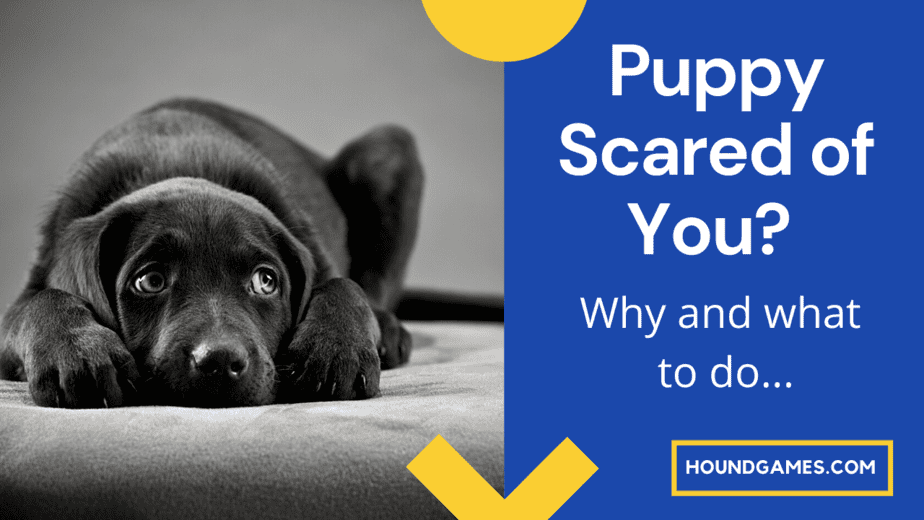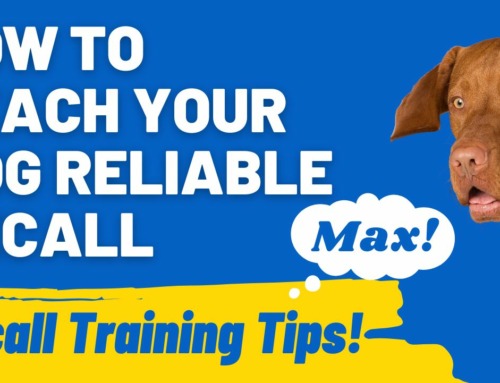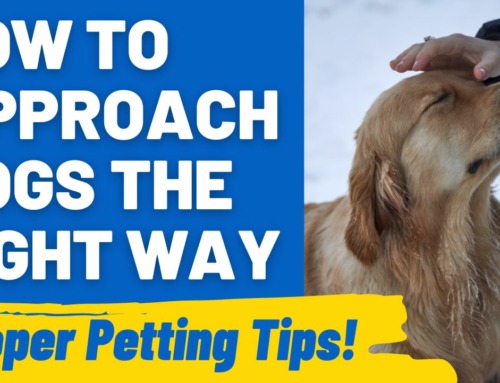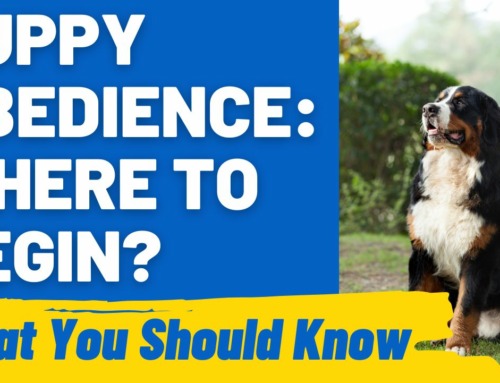Bringing a new puppy home comes with knowing they’ll be hard work, but that’s offset by all the puppy snuggles. But when the reality turns out that not only is raising a puppy hard work, but that your puppy is scared of you and doesn’t want to snuggle or play, the puppy blues can hit hard.
Puppy is scared of me? Here’s what to do…
Will your puppy ever stop being scared of you? Will you and your puppy have the adventurous life you’d planned on having?
Your puppy being scared of you isn’t the end of the world, but you do need to take steps to help your puppy for the best outcome.
We’ll cover how to determine when your puppy is scared of you, reasons why your puppy may be scared of you, and how to help your puppy become not scared.
Signs your puppy is scared of you
Dogs communicate much more through body language than they do through any sort of verbal language. This means that when interacting with your puppy, you’ll need to look – rather than listen – for signs of distress.
When puppies are scared, they may display their worries through a variety of means, from subtle body language, to growling or biting.
The Ladder of Aggression provides an excellent framework for thinking about fearful body language in dogs.
At the bottom of the ladder, when a puppy is mildly worried or concerned, they display many subtle cues that are often missed. Signs your puppy is starting to become worried or scared include:
- Yawning (when not tired)
- Licking their lips (when not anticipating food)
- Blinking slowly/squinting
- Turning their head or body away
- Body shaking
If you notice your puppy displaying any of the above signs, take note. These are often the first signs you get that your puppy is not comfortable with something.
However, just because your puppy is showing one of these signs, it doesn’t definitely indicate your puppy is scared of you. For instance, body shaking could just be a sign your puppy is cold.
Because these cues can be so subtle, though, many people do not notice a dog’s worry at this point. When the earlier signs of fear are ignored, puppies often “climb the ladder” in an attempt to better communicate their concerns.
A puppy that is escalating in fear may, in order of next steps up the ladder:
– Walk away from a situation
– Put their ears back and creep closely on the ground
– Crouch and tuck their tail
– Lay down on their side with one leg up in the air
– Stiffen, become frozen, and stare intensely
– Growl
– Snap
– Bite
Wait, isn’t a puppy that bites behaving aggressively? In some cases, yes.
In other cases, puppies may growl or bite when they feel all prior attempts of communicating their fear have been ignored, and they really want the scary thing to go away.
If you think your puppy is dealing with aggression, then be sure to read our article about it here.
Anytime you are deciphering dog body language, it’s important to take the entire picture into account. It’s also important to consider that interpreting a dog’s body language is a skill, and seeking professional help is valid.
If your puppy is displaying a lot of fear and acting scared, especially if things are escalating to growling or biting, it’s wise to bring in a professional to quickly get a handle on the situation. We also have this post on anxiety aggression here for you to read.
Two options to find an educated dog behavior professional to help include searching for a Certified Dog Behavior Consultant (CDBC) with the IAABC or a Certified Behavior Consultant Canine (CBCC-KA) with the CCPDT.
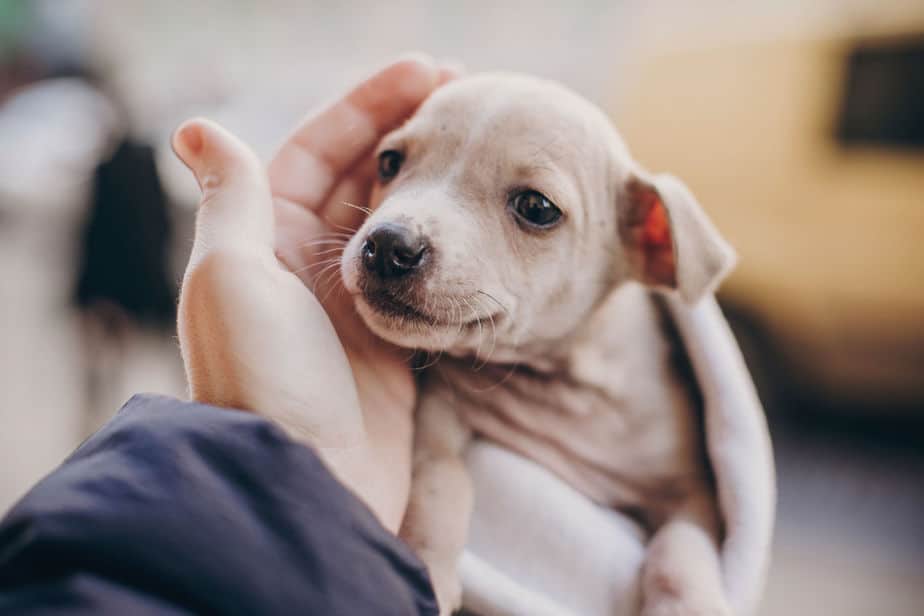
Why is your puppy acting scared of you?
Behavior, including when puppies act scared, is always a combination of their genetics and environmental experiences. Puppies may be prone to being fearful of new people due to their breed and individual genetic history, as well as any experiences they’ve learned from in their life.
If you think it was caused due to a disciplinary action you took, then after you have finished reading this article, you might like to read about puppy discipline here.
Genetics causing fear
It turns out it’s not all in how you raise them. That common manta – and the idea that good owners raise “good” dogs – ignores how much influence genetics have on behavior.
If dogs were born with a completely clean slate, we wouldn’t need separate breeds to do different dog jobs, like herding or retrieving.
If your puppy has been scared of you since the day you brought them home, and that hasn’t changed as you’ve allowed them time to settle in, it’s very likely your puppy has a lot of fear simply due to the genes they were born with.
It’s my experience that puppies that display a high level of fearfulness as young puppies often remain somewhat fearful throughout their lives.
Thus, if having a confident dog that is friendly with all family members is important to you, it’s imperative you seek out a puppy from an ethical breeder that has a history of producing the personality you want in your new dog.
As certified animal behavior professional Trish McMillan has said, “Some dogs can’t be fixed, and some dogs can’t be broken.” Her quote speaks to the power that genetics have on dog behavior.
If your puppy is generally fearful, including scared of you, that doesn’t mean all is lost, though!
While genetics do influence dog behavior, they generally provide our dogs with a flexible section along a spectrum of fearful to confident, rather than an end point.
For example, it’s often a realistic goal to help a fearful puppy become less scared of you, but it’s not a realistic goal for a scared puppy to become a social butterfly that never has any worries.
The first goal likely fits within the genetic framework we start with when dealing with scared puppies, while the second does not.
So, besides genetics, what other reasons are there for your puppy to be scared of you?
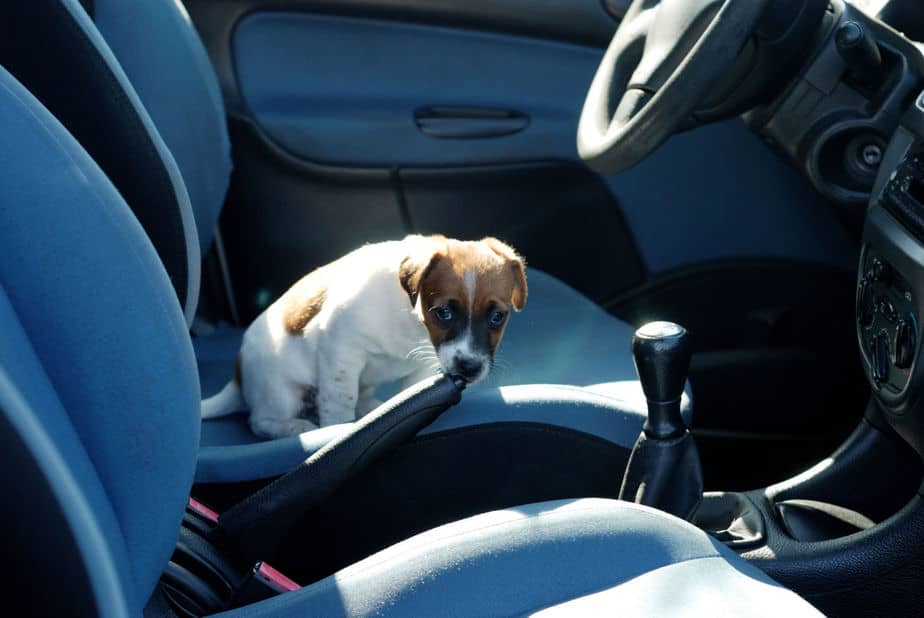
Lack of socialization causing fear
Your puppy might be cautious about meeting you – a new person – if they previously had only met the owners of their mom. Even though genetics play a role in behavior, socialization to new people, places, and things is still very important.
Because the period of time where puppies are most receptive to socialization occurs when they are typically between 6-12 weeks old, your puppy may be behind in learning about their world. This will make them more cautious in general if their breeder or foster home did not do any appropriate socialization activities.
It’s also the case that puppies have a fear period that overlaps their socialization period, often occurring from 8-11 weeks old. A second fear period may appear at some point during adolescence, when your puppy is 6-14 months old.
During a fear period, your puppy is more cautious of new things than normal. Because this fear period also often coincides with a lot of life changes for a puppy – leaving their litter and moving to a new home – it’s not unreasonable for puppies to be unsure of their new owners.
Finally, your puppy may be acting scared of you because of a bad experience.
When we talk about puppies having bad experiences, it doesn’t mean they were abused or mistreated. Instead, it means that something the puppy perceived as scary happened, and they associated that experience with you (or humans in general).
This can be as subtle as a loud noise happening when you reach for your puppy, and then they associate you reaching towards them with scary loud noises happening.
If you are seeing signs of anxiety in your puppy in a variety of situations, including many situations involving you, it’s more likely you are dealing with a lack of overall socialization or the makeup of their genes.
Anxiety that occurs with one specific person, or in a specific situation only, is more likely associated with a previous negative experience, or a lack of socialization, to that person or situation.
If you think your puppy doesn’t like you, then be sure to also read our post on this here. Or if you’re interested in knowing how long it takes for your puppy to bond with you, we also have this post: How Long For a Puppy to Know You… (Revealed)
How to make your puppy not scared of you
The first step to helping your puppy be less scared of you is to determine if they are scared of you in a specific situation – for example when you reach to pick them up or put them in their kennel – or if they are scared of you in most situations.
Puppies that are broadly worried about their owner often need the help of a behavior professional at some point. In comparison, a specific problem situation is easier to manage.
If your puppy is scared of you in general, it’s important to never force them to interact with you. Forcing a puppy to be in a scary situation is called “flooding” in behavior terms, and is the equivalent of throwing your puppy into the deep end of the pool and hoping they learn to swim.
Some puppies learn to swim. Some puppies drown.
Instead, we want to utilize desensitization and counterconditioning protocols to help teach your puppy to not be scared of you. Desensitization and counterconditioning, often abbreviated as CC/DS, are the equivalent of wading into the water and teaching your puppy to swim as they are comfortable.
Desensitization is the process by which your puppy gets used to something after many not-scary exposures. Counterconditioning is the process by which we teach a puppy that something scary is actually wonderful, by pairing the scary thing with something the puppy likes.
This is also a helpful resource when managing anxiety in puppies: 7 Proven Products for Dog Anxiety.
Steps to reducing fear in puppies
In the case of your puppy is scared of you, an example counterconditioning protocol could be:
- Puppy is in your presence (but not acting scared – remember to avoid flooding!)
- You toss a delicious treat towards your puppy (your presence = delicious treats.)
- You repeat steps 1 and 2 until your puppy starts to be excited by your presence, indicating you have successfully changed their feelings.
It’s critical to note the order of events in the above example. It goes: Person takes one step closer → delicious treats appear
And NOT:
Delicious treats appear → person takes one step closer
In the first example, the scary thing occurs before the good thing, while the opposite occurs in the second example. Often owners try to use yummy treats to lure a scared dog closer, which usually results in the dog disliking the treat because it “predicts” something scary occurring.
This is why step 2 instructs you to toss the treat towards your puppy, rather than having them approach you to take it from your hand.
Time to adjust, patience, and counterconditioning will all help your scared puppy become more comfortable with you.
If your puppy is only scared of you in specific situations, the general outline of counterconditioning still applies. Instead of using CC/DS when you are around your puppy, you’ll use it in situations where your puppy is specifically scared of you.
For a puppy that is scared of you reaching towards them, this might look like tossing a treat after moving your hand, then after extending your hand in a different direction, and then after extending your hand in your puppy’s direction. As you spend more time with your puppy without any bad experiences occurring, they will learn to trust you and be comfortable in your presence.
You may also wish to read our post Puppy Cries in Car (What to do)
Puppy is scared of you but not your partner
The same advice applies if your puppy is scared of you, but not your partner. It might be the case that your puppy has formed a closer bond with your partner due to the experiences they’ve shared, or that your puppy wasn’t socialized to people of your gender, race, stature, or even with your hairstyle!
If your puppy is comfortable with your partner, your partner can assist in helping your puppy learn to be comfortable with you, too.
Instead of tossing treats at your puppy when you are around, you can start by having your partner feed the puppy treats whenever you enter the room.
Not only is this still an effective way to teach your puppy that your presence predicts good things, but it avoids your puppy feeling conflicted about approaching you for a treat.
As your puppy becomes more comfortable in your presence, you can switch to tossing the treats on occasion yourself, taking care to avoid using the treats as a bribe for the puppy to approach you.
If you feel like your puppy is depressed or sad, then be sure to read our post about that subject here.
Final Word
Don’t be too discouraged if your puppy is fearful of you. It can take some time to form a bond and build trust. Be patient, loving, and encouraging, and with time, your puppy will become your best friend.

